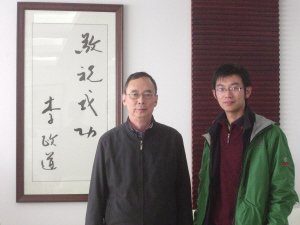From Chinese media
University pioneers reform of higher education
Updated: 2010-12-21 17:27
By Song Wei (chinadaily.com.cn)
The main problem with the country’s higher education is that universities and colleges lack decision-making rights to select and enroll students, said Zhu Qingshi, president and founder of South University of Science and Technology of China (SUSTC)in a CCTV news program on Monday.
 Zhu Qingshi (L) poses for a photo with a journalist. [Photo/Shandong Commercial Times] |
The core of the decision-making right is the right to enroll and grant degrees, Zhu explained. Currently in China, that decision-making right belongs to the Ministry of Education (MOE). High school graduates have to take the national college entrance examination to get into any college.
|
||||
The Shenzhen-based university, which has spent three years preparing but is still unauthorized by MOE, could wait no more. It announced its first enrollment plan of 50 students for an experimental class on the school’s official website Dec 15.
In addition to free tuition, each of the 50 students will get 10,000 yuan ($1,502) a year to cover their living expenses. There would be one teacher for every eight students. Despite the offer, questions remained about how many students would want to enroll at a school whose degree is not authorized by the Ministry.
However, the consultation meeting held three days later turned out to be the most significant day for SUSTC: More than 600 parents with their children showed up.
Few of these parents said they are concerned about the authority of the school’s degree because they believe that the knowledge and skill their children would learn in college mattered most.
Zhu referred the degree granted by the MOE to an “iron rice bowl” – one’s future will be secured only when he gets into a certain university. Therefore, instead of focusing on teaching improvement, schools spare no efforts to get authorization from the Ministry and focus on public relations.
Zhu said the fact that more and more graduates can’t find jobs these days means that simply getting a diploma does not guarantee a job, and that a reform plan should include instilling competition among universities.
"The only way to energize China’s higher education system is to shatter the iron rice bowl – let the degree be tested by society, not just a stamp affixed by the Ministry," Zhu added.
"I am going to give lessons to my students, and I am going to tell them something about innovation," Zhu answered when asked what he was going to teach.
E-paper

Ear We Go
China and the world set to embrace the merciful, peaceful year of rabbit
Preview of the coming issue
Carrefour finds the going tough in China
Maid to Order
Specials

Mysteries written in blood
Historical records and Caucasian features of locals suggest link with Roman Empire.

Winning Charm
Coastal Yantai banks on little things that matter to grow

New rules to hit property market
The State Council launched a new round of measures to rein in property prices.




